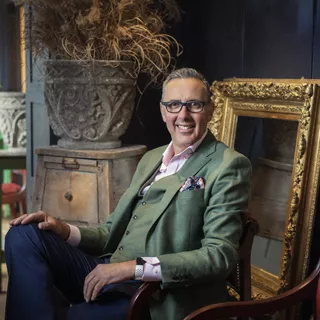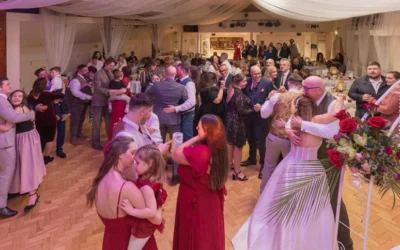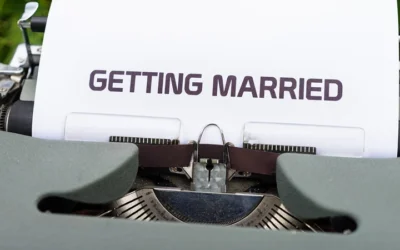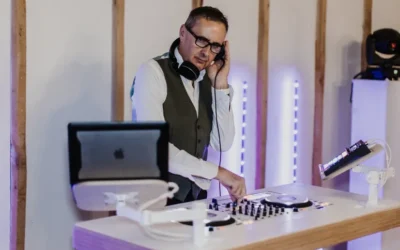Typical Wedding Budget UK: A Practical Cost Breakdown for Your Big Day
Wondering how much you should budget for your wedding in the UK? On average, the typical wedding budget UK is around £25,625*. This article provides a detailed breakdown of all major expenses—from the venue to the dress—to help you plan your special day. Dive in to find out where your money will most likely go and how to manage your budget effectively.
Key Takeaways
- The average UK wedding cost in 2025 is £25,625, showing a trend of rising expenses influenced by factors such as inflation and regional variations.
- A typical wedding budget breakdown indicates that venue and catering expenses account for 40%, with additional significant allocations for photography, attire, entertainment, and miscellaneous costs.
- Establishing a clear budget limit and prioritising key expenses are essential strategies for effective wedding planning, including budgeting for unforeseen costs and managing the guest list to control overall spending.
Understanding the Average UK Wedding Cost
The average UK wedding cost for 2025 stands at £25,625, reflecting a steady increase from £18,400 in 2022 to £24,710 in 2024. This upward trend can be attributed to several factors, including inflation, the rising popularity of eco-friendly options, and the enhanced guest experiences that couples increasingly seek. As the average wedding industry evolves, so do the expectations and spending habits of couples, making budget planning more complex yet essential.
Regional variations also play a significant role in wedding costs. For instance, weddings in London can cost approximately 42% more than the national average. Such disparities highlight the importance of considering location when planning your wedding budget. Having a grasp of these factors allows you to better anticipate expenses and make informed decisions that align with your financial capabilities.
Breakdown of a Typical Wedding Budget
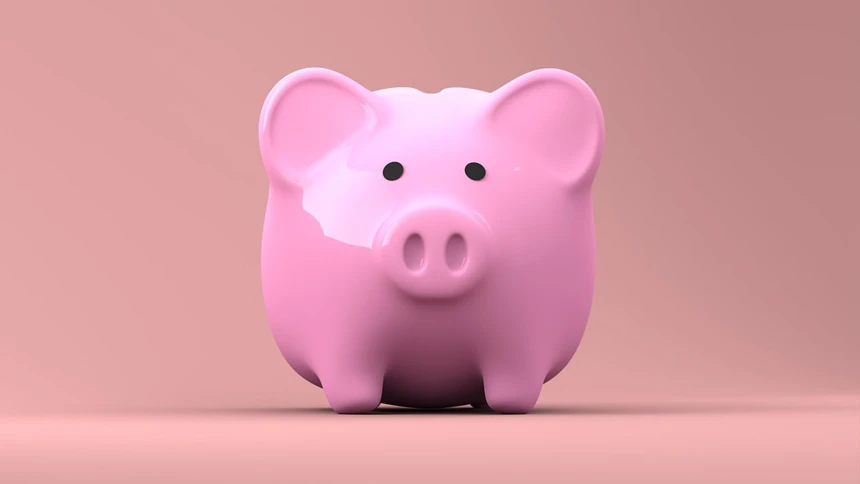
A typical wedding budget in the UK can be divided into several key categories:
- Venue and catering (40%)
- Photography and videography (10%)
- Attire (8%)
- Entertainment (8%)
- Flowers and decorations (7%)
- Stationery (3%)
- Transport (3%)
- Hair and makeup (2%)
- Miscellaneous expenses (19%) according to the national wedding survey, highlighting the importance of managing the wedding budgets, wedding budget breakdown, and wedding spending.
Understanding the costs of each category will help you allocate your budget effectively for these essential elements of your wedding day.
Below is a detailed breakdown of each category to help you understand where your money may go.
Venue and Catering Costs
The venue and catering typically account for the largest portion of a wedding budget, often comprising around 40% of the total. If your overall wedding budget is £25,500, you can expect to allocate approximately £12,750 for venue hire, food, and drink. This significant wedding spend underscores the importance of choosing the right venue and catering options that align with your vision and budget.
When considering catering, keep the following points in mind:
- The average cost per person is about £85.
- Consider all-inclusive wedding packages that bundle venue hire with catering services to simplify planning and potentially save money.
- Be mindful of service charges, which can range from 15-25%.
- Ensure that VAT, which is 20%, is included in the quotes from vendors to avoid unexpected expenses.
A buffer of 10-15% of your catering budget can help accommodate unexpected changes or additions. Wedding planning can be unpredictable, and having a contingency fund will provide peace of mind and flexibility to accommodate any last-minute adjustments.
Wedding Photography and Videography
Photography and videography are essential for capturing the precious moments of your wedding day. Consider the following budget guidelines:
- Typically receive around 10% of the wedding budget.
- Allocating approximately 12% ensures you can secure high-quality services.
- Typical cost range for wedding photography packages: £1,150 to £10,000.
- Average cost for both photography and videography services: around £3,000.
Several factors can influence these costs, such as the inclusion of additional shooters, travel fees, and extensive editing requirements. While some couples may consider forgoing a videographer to save costs, it’s strongly suggested to include one if your budget allows, as the video will provide a different, dynamic perspective of your day.
Investing in professional photography and videography ensures that you capture the essence of your wedding, creating visual memories that last a lifetime as a photographer.
Bride’s Dress and Groom’s Suit
Wedding attire, including the bride’s dress and groom’s suit, is another significant expense, typically accounting for about 8% of the wedding budget. The expected cost for both is approximately £2,000. Details include:
- The average cost of a wedding dress in the UK ranges from £1,500 to £2,500.
- Bridal gowns can cost anywhere between £500 and £5,000+.
- Alterations, which are often necessary, can add another £200 to £800 to the cost.
The budget for wedding attire can vary widely:
- Groom’s suit: average cost between £400 and £800, with possible investments ranging from £200 to £1,000+
- Groomsmen attire rentals: typically cost between £150 and £250 per person
- Bridesmaid dresses: usually fall in the price ranges of £100 to £300 per person
Given these wide ranges, allocate your budget thoughtfully, considering both quality and comfort. The right attire not only enhances the aesthetic of your wedding but also contributes to your confidence and comfort throughout the day.
Music and Entertainment
Music and entertainment play a vital role in creating a lively and enjoyable atmosphere for your wedding. Typically:
- 5-12% of the wedding budget is allocated to music and entertainment expenses.
- The cost range for entertainment at a wedding is usually between £1,000 and £2,500.
- Hiring a live band averages around £4,300, which is significantly higher than hiring a DJ.
Planning for wedding music and entertainment ensures your guests have a memorable time. Whether you prefer a live band for a more dynamic experience or a DJ for a diverse music selection, these choices will significantly impact your budget and the atmosphere of your wedding entertainment.
Ultimately, investing in quality entertainment is worth the expense, as it sets the tone for your celebration and ensures that your guests leave with lasting memories of a fun and joyful event.
Flowers and Décor
Flowers and décor add beauty and elegance to your wedding, typically accounting for about 10% of the total wedding costs. The spending range for these elements is between £500 and £3,500, with the average cost of hiring a florist around £2,800. Factors such as flower type, seasonality, and the size of arrangements can significantly influence wedding flowers costs.
Preference for locally sourced flowers over imported ones can also impact your budget. Considering these factors allows you to plan a stunning visual experience that aligns with your vision and budget.
Stationery and Invitations
Stationery and invitations are essential for communicating with your guests, typically accounting for around 3% of the wedding budget. Postage costs, especially with RSVP cards, can add up significantly. Managing these costs can be easier with cost-effective alternatives like digital RSVPs.
Budgeting for stationery ensures that you can effectively communicate essential details to your guests, contributing to a well-organised wedding.
Transport Costs
Transport costs are an essential component of wedding planning, typically accounting for about 3% of the wedding budget. These costs cover transportation for the couple and guests, factoring in venue location and guest arrangements.
Careful planning of your transport needs ensures everyone arrives on time and in style, contributing to a smooth and enjoyable planned wedding day.
Hair and Makeup
Hair and makeup are crucial for the overall appearance of the bride’s party, typically accounting for about 2% of the wedding cost. Bridal trials and additional services for the bridal party can add to the overall expense.
Thoughtful budgeting for hair and makeup ensures everyone looks their best, contributing to the overall confidence and enjoyment of your wedding day, including the groom.
Miscellaneous Expenses
Miscellaneous expenses, which include gifts and licenses, are usually set at around 19% of the total wedding budget. Commonly overlooked expenses include marriage licenses, legal fees, and cake tastings.
After-party events like brunch can incur additional costs that should be considered. Accounting for these expenses helps ensure a comprehensive and realistic wedding budget.
Creating Your Wedding Budget
Creating a wedding budget requires understanding the main elements, assessing financial limitations, and discussing plans early with family. Knowing which aspects of the day require larger budgets can be challenging for first-time planners, but identifying key priorities helps allocate the budget effectively in the planning process to create the best experience.
Setting Financial Limits
Setting a budget limit helps manage expectations and avoid overspending. Couples should have a clear budget limit in mind when planning their wedding.
A detailed list of non-negotiable items helps maintain focus on budget priorities. Setting aside about 10% of the overall wedding budget for photography and videography is advisable.
Funding Discussions
Early consultations with family regarding financial contributions can clarify budget expectations and prevent future conflicts. These discussions are essential for understanding available resources and setting realistic expectations.
Guest List Management
A well-managed guest list is crucial for staying within budget. Smaller wedding guests lists can lead to significant savings on wedding venue and catering costs. Opting for a midweek wedding or choosing dry hire can also reduce costs.
A contingency fund of about 10% of your overall budget is advisable to cover unexpected expenses.
Prioritising Wedding Expenses
Assessing personal values and preferences helps prioritise wedding expenses and determine which aspects are most important. Knowing your budget limits and prioritising must-haves helps avoid overspending.
Major Cost Allocation
Focusing on key costs, like venue and catering, helps manage the overall wedding budget. It’s common for couples to allocate about 40% of their total wedding budget to these expenses.
Personal Touches and Experiences
Investing in personal touches like custom décor or unique experiences can significantly enhance the overall guest experience. More couples are spending time focusing on creating special moments that reflect their personal stories instead of lavish extravagance. Many couples are also married and looking for ways to personalise their celebrations.
Managing Hidden Wedding Costs
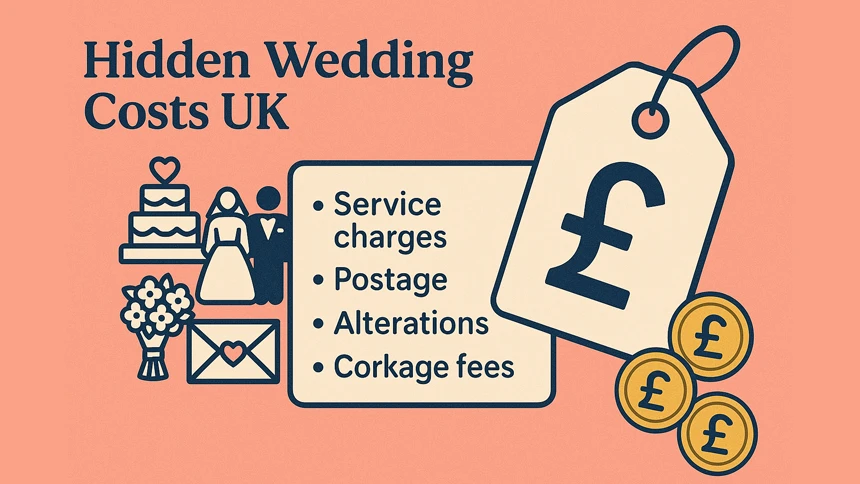
Hidden costs can significantly impact your overall wedding budget if not anticipated. These can include supplier meals, service charges, and overtime fees for vendors. Effective communication with vendors is crucial to avoid unexpected additional charges, especially in light of rising costs.
To safeguard against these unforeseen expenses, budgeting an additional 10-15% of your total wedding budget is advisable. This contingency fund will help you manage any surprises without compromising other aspects of your wedding, including considering wedding insurance.
Tips for Sticking to Your Wedding Budget
Sticking to your wedding budget requires diligence and regular updates. To manage your budget effectively:
- Use a dedicated wedding budget spreadsheet or app to track expenses.
- Update your budget with actual expenses regularly.
- Make necessary adjustments based on updated expenses to ensure you stay within financial limits and spend wisely.
Additionally, being flexible and willing to make adjustments can help you manage your budget better. Cutting down on non-essential items or finding cost-effective alternatives can help you stay committed to your budget, making wedding planning less stressful and saving you money.
Summary
Understanding and managing your wedding budget is crucial for planning a memorable and financially sustainable wedding. From understanding the average UK wedding cost to breaking down expenses across various categories, this guide provides a comprehensive overview to help you navigate the financial aspects of your big day. Prioritising key expenses, anticipating hidden costs, and using effective budgeting tools are essential steps in ensuring your wedding remains within budget.
By following these practical tips and strategies, you can create a wedding that reflects your vision and love story without the stress of financial strain. Approach your wedding planning with confidence, knowing that you have the knowledge and tools to manage your budget effectively. Here’s to a beautiful and memorable wedding day!
Frequently Asked Questions
What is the average UK wedding cost for 2025?
The average UK wedding cost for 2025 is projected to be £25,625. This figure reflects current trends and expectations in the wedding industry.
How much should I allocate for venue and catering?
You should allocate approximately 40% of your total wedding budget for venue and catering to ensure a quality experience for you and your guests. Prioritising these aspects can significantly impact the overall success of your event.
What are some hidden wedding costs I should be aware of?
Be aware that hidden wedding costs often include supplier meals, service charges, and potential overtime fees for vendors. These expenses can significantly increase your overall budget if not accounted for in advance.
How can I save on wedding stationery and invitations?
To save on wedding stationery and invitations, utilise digital RSVPs and explore DIY options for a more budget-friendly approach. This can significantly reduce costs while maintaining a personal touch.
Why is it important to have early financial discussions with family?
Engaging in early financial discussions with family is crucial to establish clear budget expectations and mitigate potential conflicts. This proactive approach fosters transparency and aligns everyone’s financial goals.
* On average, the typical wedding budget, according to Compare Wedding Insurance, is around £25,625.
One of my many reviews from clients:
We recently had the pleasure of having Alan and Ru as our DJ and Master of ceremonies for our wedding at Basing House, and we couldn’t be more thrilled with their services. From the moment the day began, everything ran seamlessly. Alan and Ru handled every detail with professionalism and grace, quickly resolving any issues that arose so we could fully enjoy our special day.
One of the highlights was Alan’s beautiful love story, which he read before our first dance. It added a truly magical touch to the evening that our guests still talk about. Their energy and enthusiasm kept the celebration lively, and we are incredibly grateful for their hard work and dedication. We can’t thank Alan and Ru enough for making our wedding unforgettable!


